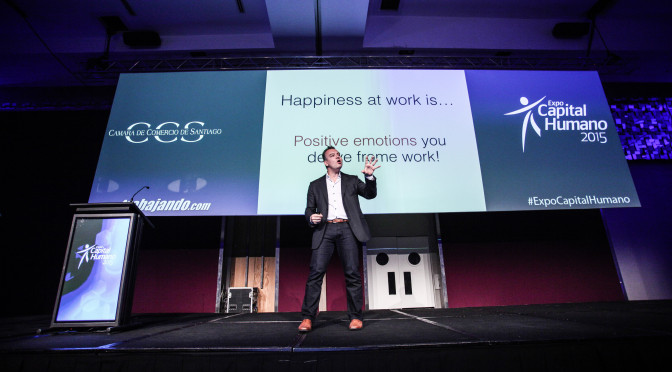Have you subscribed to our Youtube channel yet? It has a ton of great videos about happiness at work.
-

I’m taking February off. Here’s why.
Is a Chief Happiness Officer always happy at work? Heck no.
Everyone has bad days once in a while and I’m no exception. I always say that if someone is always happy, there’s something wrong with them :)
But for some time now I’ve been feeling burnt out.
Don’t get me wrong – I love giving speeches and workshops. Nothing beats the kick of getting on stage in front of an audience and sharing an important message with them. But over the last few months, I’ve been getting bogged down in a lot of my daily chores and maintenance tasks that just didn’t light my fire.
I’ve also felt like I’ve been stagnating professionally. Business is great, we’re making a ton of money and clients love what we do, but I’ve been feeling frustrated that we haven’t progressed beyond that and grown as a company lately.
If there’s one lesson we try to teach it’s this: when you’re not happy at work, you should take it seriously and do something about it. So it would be pretty hypocritical of me not to do that myself :)
So when I noticed these feelings in myself and, by coincidence, that my schedule for February was actually pretty free of big events and gigs I decided to take February off.
I’ve delegated all my tasks to my awesome coworkers and have closed my inboxes (here’s why I don’t just use an autoreply/vacation message) and company phone so no one can reach me.
What will I do with that time? I don’t know. I have not planned anything and that’s on purpose. I think that completely free and unstructured time is what frees your mind to think big thoughts. Too many plans (or any plans at all) would interfere with that.
So I’ll see you again in March.
-
Conference in Copenhagen
We are hard at work finalizing this year’s version of our happiness at work conference in Copenhagen.
While we do have some international speakers, most of the day is in Danish, so this update is mostly for our Danish readers :)
So if you’re interested, read more about this year’s konference om arbejdsglæde. And get your tickets soon – we haven’t even announced the full program yet, and we’ve already sold 100 tickets.
-
Meet the world’s happiest DJ
A few years ago this German DJ became famous on youtube and he used that as a springboard to quit the day job he hated and become a full-time DJ.
In this video from our 2015 conference about happiness at work he plays a very short set and then shares his story.
Meet a man who had the courage to go his own way and became world famous for being happy at work.
-
Upcoming international gigs: Holland, Poland, UK and USA

Here are the upcoming international events you can catch me at:
March 23, The Hague, Holland: Happy People Better Business
April 12+13, Birmingham, UK: #SD16 Service Desk Conference
April 27+28, Wroclaw, Poland: Kongres E(x)plory Innowacje
May 9-11, Miami, USA: WorldBlu Summit
Often our speeches are closed events for one client, but these are all open conferences where anyone can buy a ticket. See you there?
-

How to praise yourself at work – and how NOT to

Is it OK to praise yourself at work?
Could you tell a coworker something like “Hey, let me tell you what I just did – it was AWESOME!”
Is it OK to send an email to the rest of your team to proudly share that you found a creative solution to a tough problem?
Can you take a little time in a project meeting to tell others about that task you just completed on time and under budget?
Most people are reluctant to do that. They don’t want to seem arrogant or boastful or like they have a big head. But if you ask me, it’s perfectly OK to be proud of the good work you do AND to share that pride with others.
Just as an example, If I’ve given a speech that I felt went REALLY well (which happens all the time these days) I share that with my coworkers. I tell them what happened and what it was that worked so well.
However, self-praise can become really annoying if you do it wrong :) Here are 8 tips for praising yourself at work:
1: Only praise yourself when you’ve earned it
Just like any other praise, self-praise must be earned. You must have done something awesome before you praise yourself, otherwise it’s completely meaningless.
2: Share the praise
If you praise yourself for something you’ve done together with others, then you must include them in the praise. In that case you don’t say “I’m awesome,” you say “We’re awesome.”
3: Don’t always only praise yourself
It’s no good if you always only praise yourself and never recognize others. It’s required of all of us self-praisers that we’re especially good at acknowledging the cool things others do.
4: Admit your mistakes too
If you’re good at praising yourself when you rock, you should be the first to admit when you suck, apologize for your mistakes and be willing to learn from them and improve. People who can only see the good they do and completely overlook their own flaws invite nothing but scorn and contempt.
In fact, why not celebrate your mistakes?
5: Praise yourself with genuine enthusiasm
When you praise yourself, do it with an honest infectious enthusiasm. It’s OK to be proud of yourself. It’s OK to have a smile on your face, a spring in your step and pride in your voice when you share your accomplishments. In fact, it will be received more positively by others than if you do it with false humility.
6: Moderation in all things
It goes without saying that anything can be overdone – including self-praise. Don’t overdo it.
7: Practice, practice, practice
Practice makes perfect. It’s banal but true. Try it, see what works and then improve from there.
8: Be ready to face skepticism
Praise is sorely lacking from many workplace – including self-praise. This may lead to skepticism and resistance from others if you start doing it. If this happens, consider carefully if the criticism is because you’ve gone too far – in which case you should listen to it – or if it’s simply that people are not used to it – in which case you should continue doing it.
Why you should praise yourself
We can see four major advantages of self-praise. First, when you share your successes, others can learn from your best practices and maybe apply them themselves.
Secondly, genuine enthusiasm is infectious. When you share something that made you happy, others become a little happier too.
Thirdly, you can inspire others to also share their victories, so the whole team becomes better at sharing what works, to the benefit of all.
And finally, if you are good at praising yourself, you’re not as dependent on receiving praise from others. As Spencer Tracy put it:
It is up to us to give ourselves recognition. If we wait for it to come from others, we feel resentful when it doesn’t, and when it does, we may well reject it.
And if all else fails, there’s always the self-praise machine that an employee at one of our clients built:
Your take
What do you think? Do you ever praise yourself at work? How do you do it? What are good ways or bad ways to do it? Write a comment, we’d love to hear your take.
Related posts
-

The 5 most important findings from the science of happiness that apply at work
Happy workplaces are more profitable and innovative, attract the best employees and have lower absenteeism and employee turnover rates. Simply put, happy companies make more money.
But how do you create a happy workplace? We believe some of the answers are found in positive psychology – a fascinating field and one of the main inspirations for the work we do with our clients around the world.
Traditional psychology looks at everything that can go wrong with our minds – psychosis, neurosis, phobias, depression etc – and asks how it can be treated/cured. It’s an incredibly important field but positive psychology asks the opposite question: When are we happy? What does it take for people to live good lives and thrive psychologically? The field has been especially active for the last 30 years and we are learning some really interesting and surprising things about happiness.
Here are the five findings from positive psychology that we believe are the most relevant in the workplace.
1: Positive emotions have many beneficial effect on us and on our job performance
We tend to trivialize emotions in the workplace. It doesn’t matter what you feel, the prevailing thinking goes – it matters what you think.
You should never show emotions at work and the true professional has no emotions at work. You should be like Spock from Star Trek who once said “Emotions are alien to me. I’m a scientist.”
But this turns out to be impossible. Not only do we have emotions, those emotions affect our physical and mental well-being in many ways and, in general, positive emotions have some strong positive effects on our work performance.
Here’s one example:
… a number of the participants were either shown a comedy movie clip or treated to free chocolate, drinks and fruit. Others were questioned about recent family tragedies, such as bereavements, to assess whether lower levels of happiness were later associated with lower levels of productivity.
… they found happiness made people around 12% more productive.
So far, studies have shown that experiencing positive emotions makes us:
- More productive
- More creative
- Healthier
- Braver
- Less stressed
- More resilient
- More helpful
- Less biased
- More optimistic
- More intrinsically motivated
- Faster learners
- More likeable
- Better team players
- More generous
Simply put, happy people not only feel better and thrive more, they also do better work. This helps explain why happy companies are more profitable and hence why no workplace can afford to ignore how people feel at work.
2: Emotions are contagious
One study in emotional contagion at work brought test subjects together for a simulated negotiation. They didn’t know that one member of the group was an actor extensively trained by the researchers to exhibit certain emotions during the meeting.
Would the emotions of one person affect the rest of the group? The answer is yes – and when the emotions transmitted by the actor were positive, the whole group became more effective:
There was a significant influence of emotional contagion on individual-level attitudes and group processes. As predicted, the positive emotional contagion group members experienced improved cooperation, decreased conflict, and increased perceived task performance.
It turns out that how people around you feel rubs off on you and vice versa. Being around others involves taking on some of their emotions and transferring some of yours to them. We have all experienced this. Being around happy people makes us a little happier. Being around miserable bastards has the opposite effect.
This is highly relevant in the workplace because it shows we don’t exist in isolation. Happiness is a social phenomenon and each of us influence, and are in turn influenced by, the people around us.
3: Small actions can have a large effect on our happiness
One of the coolest things about positive psychology is that it is highly research-based and the various interventions are tested in numerous studies.
You may think that in order to become happier in life, you have to win the lottery or achieve massive amounts of success. But what they have consistently found is that simple interventions are surprisingly effective. Here are some examples of proven happiness interventions:
- Write a gratitude letter to a person who has helped you
- Make a list of 3 good things that happened to you today/this week
- Perform a random act of kindness for someone else
- Receive positive feedback
In the workplace, this means that while organizational factors like strategies, vision, values and processes do matter, it also matters how we work together and interact in our teams on a day-to-day basis. Do managers treat their employees with respect and kindness? Do coworkers trust each other, help each other and maintain good relationships? Do people take the time to treat each other well in the workplace?
However, the research also shows that happiness interventions only work under 2 conditions:
- You have to do it and keep doing it. This is hardly surprising.
- You have to want to do it yourself. If someone else forces you to do it, it doesn’t increase happiness. This is why you have to be careful not to mandate certain behaviors at work in the name of happiness.
4: Unexpected things make us happy
According to research, we become a happier when good things happen to us (duh!) but the effect is even bigger when good things happen to us unexpectedly:
Emory University and Baylor College of Medicine researchers used Magnetic Resonance Imaging brain scans to measure changes in human brain activity in response to a sequence of pleasurable stimuli.
They used a computer-controlled device to squirt fruit juice or water into the mouths of 25 research participants. The patterns of the squirting were either predictable or unpredictable.
The researchers found that the MRI scans showed a brain area called the nucleus accumbens to be much more active when the subjects received unpredictable patterns of juice and water.
So:
- Something nice happens that you expect = good
- Something nice happens unexpectedly = even better
This is interesting in the context of happiness at work because many of the things companies do to make their employees happier are utterly predictable: Summer parties, Christmas parties, Bonuses, team events, and so on happen on an almost completely fixed schedule, which serves to diminish their effectiveness.
This is why we advocate also doing random acts of workplace kindness. According to this research, a small well-meant surprising gesture towards an employee or a team may make them much happier.
So what could you do, to surprise a co-worker today? Here are some examples:
- A really nice, surprising reward for a star performer.
- Give your co-workers a morning surprise.
- Random acts of kindness at work.
5: Making others happy, makes us happy
It’s been shown consistently that doing things to make yourself happier has a small effect on your happiness but doing things for others, elevates their happiness AND yours much more.
In one study, participants received a small amount of money that they could spend either on themselves or on others. Their happiness was measured before and after, and subjects who spent the money on others experiences a much larger boost to their happiness.
This means that one of the most reliable paths to happiness at work is to focus less on your own happiness and more on making others – be it coworkers or customers – happier.
This is not to say that you should sacrifice yourself for others, to the point where you neglect your own happiness. It just means that focusing only on your own happiness is likely to be a shallow, meaningless and ultimately unsuccessful.
The upshot
Happy employees are healthier and more productive and happy companies make more money.
That’s why every company and every manager need to make happiness at work their most important strategic priority. These findings from positive psychology help point the way on how to do it.
Related posts
-
3 reasons why you MUST go to the WorldBlu Summit May 9-11 in Miami
If you go to only one business conference this year, make it the WorldBlu Summit on May 9-11 in Miami.
I have been to all their previous events, they always knock my socks off and this one promises to be absolutely amazing and inspiring again.
The theme for the event is democracy at work, ie. how do you create workplaces that are based on freedom rather than on command and control.
Here are three reasons why you should go too.
1: Make your company more profitable
Freedom-based workplaces reduce unneeded hierarchy, processes, bureaucracy and red tape and set employees free to do really good work. This makes the company more innovative and profitable.2: Make your workplace happier
Secondly, democratic workplaces are happier workplaces. When you grant employees trust, autonomy and freedom to make decisions, there is a much bigger chance that they will be happy at work.3: Meet and network with some awesome people
The conference attracts some amazing speakers and companies that are only happy to share their ideas and best practices. I have met so many cool people at this conference and I think you will too.Read all about the WorldBlu conference and sign up for it here.
-
Highly effective organization without management
You MUST watch this speech by Jos de Block from the 2015 Meaning Conference in Brighton.
He explains how he founded an organization in Holland called Buurtzorg which delivers home care. Currently almost 10,000 employees work in self-organizing teams of up to 12 people.
Each team has no manager – all colleagues are in charge of everything themselves, including hiring, training, work scheduling, conflict management, etc.
The result is that employees are incredibly happy at work because they can do work their way and aren’t burdened with huge amounts of overhead or bureaucracy.
Clients are really happy, because they get incredibly good care from people who love what they do.
This challenges all our preconceived notions of how large organizations should be run. Maybe the best boss, is no boss.
-

3 reasons why “Never Give Up” is really bad advice
Ever seen one of these little “inspirational” images on facebook or linkedin? They’re are all over the damn place :)
Not only is this kind of advice vapid and simplistic (and frankly it annoys the crap out of me), I believe that it might ultimately be doing us a major disservice.
Here are 3 reasons why “Never Give Up” is really bad advice.
1: Sometimes giving up is just the right thing to do
 I’m reminded of the story of the world famous opera singer Tina Kiberg.
I’m reminded of the story of the world famous opera singer Tina Kiberg.As a child, Tina was a competent violinist and spent her free time practicing and practicing. One day she participated in a violin contest and realized that she would never be more than a mediocre violinist and that she also enjoyed singing more. She gave up the violin, took up singing and became a leading international opera singer.
If she had seen quitting as always the wrong thing to do, she might have been stuck as a run-of-the-mill violinist. Her courage to give up is what allowed her to become a world famous opera diva.
Now try to guess what these somewhat successful people have in common: Larry Page, Sergey Brin, Tiger Woods, Reese Witherspoon, John McEnroe and John Steinbeck?
Yep, they all dropped out of Stanford.
Ever heard that “Winners never quit and quitters never win?” What nonsense!
Look at pretty much any successful person and I bet their past is littered with things they did at one time and then gave up.
Sometimes you’ve got to stick with something, even through tough times. But sometimes you have to have the courage to give up. And you have to be open to the fact, that sometimes giving up is the right way forward.
2: Powerful psychological biases already make it hard for us to give up
There are a number of cognitive processes that systematically make it harder for us to leave existing situations and move on to something new – even when we’re miserable with the status quo.
Just off the top of my mind, here are some cognitive biases, that conspire to keep us stuck in bad situations:
The sunk cost fallacy
When you’ve spent a lot of time/money/focus on something, it becomes very hard to walk away from it. People think “I’ve invested so much in this already. If I quit, that will all have been wasted.”The ambiguity effect and the status quo bias
People tend to select options for which the probability of a certain outcome is known, over an option for which the probability of that outcome is unknown. Example: “I know my current situation is tough, but I know what I have. If I give up, I don’t know what I will get.”Loss aversion and the endowment effect
Once we have something, we hate to lose it. Things we don’t have yet, don’t carry the same value.Given these cognitive biases, it’s already hard enough for us to give up, which might help explain why people stay stuck in bad jobs, bad marriages, abusive friendships etc. We don’t need the added burden of simplistic “Never give up” advice making it even harder for us.
3: Society attaches a stigma to giving up
And yet, in the face of all this evidence to the contrary, society stigmatizes people who give up. Quitting is seen as weak, as a lack of passion or as personal failure.
As I see it, “Never give up” is easy to say and therefore gets repeated a lot. It’s still not true and that makes it tremendously bad advice.
I think it makes more sense to tell people to know why they do what they do and occasionally evaluate if it still makes sense to be doing it. There should be zero shame in giving up a fight you can’t win or in dropping a goal that no longer works for you.
Quite the opposite – it’s the sign of a strong, mature mind to have the courage to reevaluate what you’re doing and either choose to keep doing it or to choose something else.
So the next time you see someone post one of those “Never give up” type images on facebook, be sure to tell them just how wrong (and potentially harmful) that type of advice can be.
Related posts











